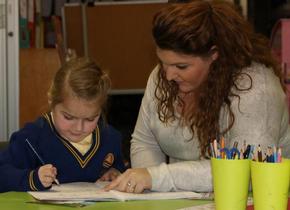English is an important part of the curriculum, which includes learning about language, literature and literacy through listening, speaking, reading, viewing and writing.
Rationale
The English program at St James the Apostle Primary School has been designed to use high impact strategies, which are underpinned by research.

The English program at St James the Apostle Primary School is guided by Science of Learning principles. Key skills and concepts are taught explicitly and covers five key components:
- Phonology: Understanding the sounds of language. This is where programs like Playberry Laser Phonics fit in, explicitly teaching the sound-letter connections.
- Orthography: Learning the writing system, focusing on reliable spelling rules and patterns.
- Morphology: Understanding the meaningful parts of words (prefixes, suffixes, and root words) to unlock vocabulary and meaning.
- Syntax: Mastering sentence structure and grammar to comprehend complex texts and write clearly.
- Semantics: Developing vocabulary and understanding the meaning of words and texts.
Curriculum
At all levels, students read, write, speak and listen as part of the English curriculum within the Victorian Curriculum.
The English curriculum aims to ensure that students:
- learn to listen to, read, view, speak, write, create and reflect on increasingly complex and sophisticated spoken, written and multimodal texts across a growing range of contexts with accuracy, fluency and purpose
- appreciate, enjoy and use the English language in all its variations and develop a sense of its richness and power to evoke feelings, convey information, form ideas, facilitate interaction with others, entertain, persuade and argue
- understand how Standard Australian English works in its spoken and written forms and in combination with non-linguistic forms of communication to create meaning
- develop interest and skills in inquiring into the aesthetic aspects of texts, and develop an informed appreciation of literature.